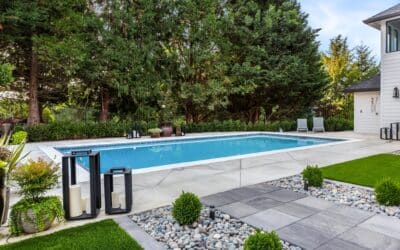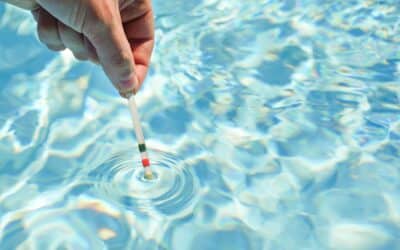Keeping your pool clean ensures it’s safe to swim in, making it the perfect way to cool off on those long summer days. As a pool owner, it’s important to note that your pool pump is an essential device that keeps the water clean. Even if you’re diligent about adding chemicals, without regular circulation through the pump, water can become stagnant and lead to the growth of harmful microorganisms. Let’s break down how long you need to run it to keep your backyard oasis looking pristine:
Water Volume And Pump Capacity
Knowing the water volume of your pool is the first step in figuring out how long you need to run your pump. Get out your measuring tape and calculator, and use the following equations:
- Volume = Length x Width x Average Depth
- Then, convert the volume to gallons by multiplying:
Gallons in your pool = Volume x 7.5
If your pool has a shallow and deep end, use the average depth. To find that, add the depth of both ends and divide by two.
For Circular Pools
To find the volume for a circular pool, you’ll still need to know the depth, but you’ll also have to find the radius, which is the length from the middle of the pool to the edge. You can also measure this by finding the diameter or width and then dividing by two. Once you have that number, use this equation:
- Radius2 x 3.14 x Depth = Volume
Understanding The Turnover Rate
To keep the pool fresh and ready to dive in, all the water in it must go through the filter at least once daily. This process is called the turnover rate, and that’s the final number we need to find. A standard pool pump takes eight hours to circulate the entire volume of water through the filter once, which is how we calculate the necessary gallons per hour (GPH) your pump should handle:
- Volume / 8 = GPH
Let’s assume your pool holds 18,000 gallons, you’ll need a pump of at least 2,250 GPH. Pump speed and efficiency are measured by how many GPH the pump can filter effectively. So, when choosing a pump, you’ll need to find one with a GPH equal to or higher than 2,250 GPH.
If you encounter pump specifications in gallons per minute (GPM), simply divide the required GPH by 60.
Time of Day
If you aren’t sure when to run your pump, look up your city’s or hydro provider’s non-peak electrical hours—that is often the best time of day for homeowners. This is usually in the evening or overnight.
On the other hand, you may also want to run your pump right after you shock your pool to help distribute the chemicals. If it isn’t convenient to run it for the full eight hours, don’t worry. You can run it for an hour in the morning and the remaining seven hours in the evening after you add the chemicals.
What About The Off-Season?
Closing up your pool before cooler weather is necessary for Ottawa pool owners. Because it gets so cold here, you only have to run the pump if you have an indoor pool, as any outdoor pool will freeze regardless of whether the pump is running or not. However, you will not have to run the pump if your pool is fully winterized. As a general rule, if there is still water in the basin, running it for two to three hours a day is recommended.
In the winter, your pump can help stop bacteria growth and prevent your pipes from freezing, which is important when it comes time to opening your pool back up in the spring.
Optimizing Pool Pump Run Time
Now that you know how long you should be running your pump in the on- and off-season, you may be wondering: can you run your pump for too long? The simple answer is no. Nothing bad will happen if you forget to turn it off after eight hours.
At Benson Pools, we have over 50 years of experience installing and providing pool maintenance in the Ottawa area. If you’re trying to determine the best pool pump for your backyard oasis, need a hand measuring the water volume in your pool, or have any other questions about pool services, we’re here to help. Contact us today.


